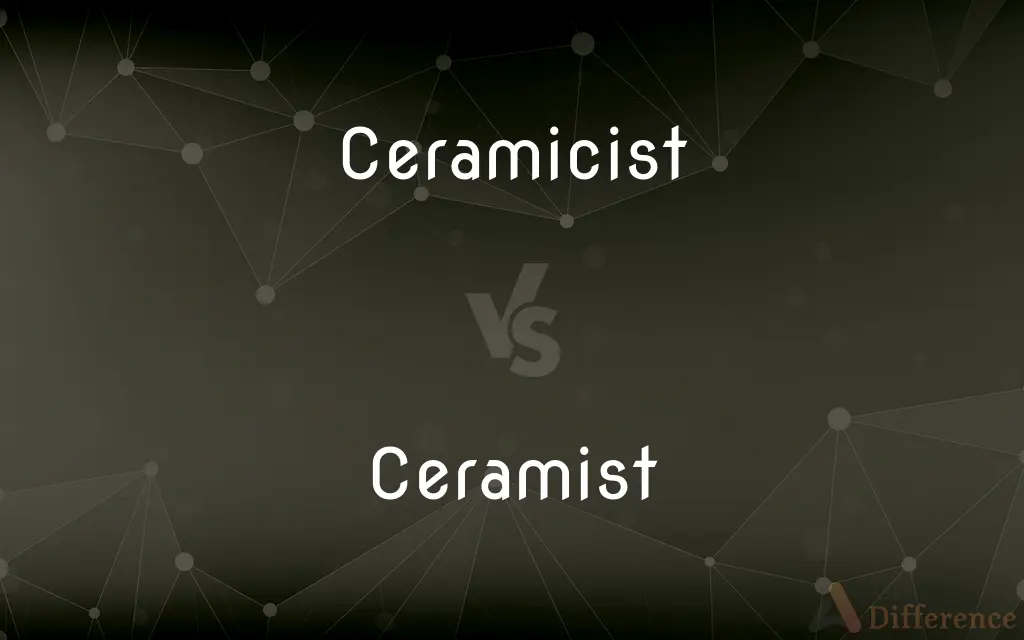Ceramicist vs. Ceramist — What's the Difference?
By Tayyaba Rehman — Updated on October 3, 2023
Ceramicist is an artist or craftsman who makes objects from clay. Ceramist is another term for a ceramicist, specifically one skilled in ceramics. Both terms are often used interchangeably.

Difference Between Ceramicist and Ceramist
Table of Contents
ADVERTISEMENT
Key Differences
Ceramicist and ceramist both refer to individuals who work with ceramics, primarily using clay to create objects. These objects can range from utilitarian items, like bowls and plates, to more decorative or artistic pieces.
The term ceramicist is slightly more common in everyday language, and might be used to describe someone with a broader range of skills or specialties within the field of ceramics. Ceramist, while less frequently used, carries a similar meaning and can often be found in more formal or specialized contexts.
While the words ceramicist and ceramist might seem to indicate different levels of proficiency or expertise, in practical usage, they're largely synonymous. Both words highlight the individual's connection to ceramics as a material and an art form.
Ceramicist could be perceived as a more modern term, with ceramist potentially seen as a more classical or traditional label. However, when it comes down to it, whether one calls themselves a ceramicist or ceramist often boils down to personal preference.
Both ceramicist and ceramist emphasize the importance of the material, ceramics, in the professional or hobbyist's work. While nuances might exist based on regional or personal preferences, the two terms largely overlap in meaning.
ADVERTISEMENT
Comparison Chart
Definition
Artist or craftsman using clay
Skilled individual in ceramics
Common Usage
More common in everyday language
Often found in formal or specialized contexts
Nuance
May indicate broader range of skills
Might be seen as more traditional
Derived From
From the word "ceramic"
Directly from "ceramic" without the extra "is"
General Perception
Seen as more modern
Perceived as more classical
Compare with Definitions
Ceramicist
A person skilled in the art of ceramics.
The ceramicist displayed her work in the local gallery.
Ceramist
An artist or craftsperson using clay as a medium.
The ceramist's pieces were always in high demand.
Ceramicist
An individual who creates objects from clay.
The ceramicist spent hours molding the intricate vase.
Ceramist
An expert in ceramics.
The ceramist crafted delicate porcelain dolls.
Ceramicist
Someone who practices the craft of ceramics.
The workshop was led by a skilled ceramicist.
Ceramist
Someone professionally involved in the making of ceramic goods.
The ceramist had a dedicated clientele who loved her designs.
Ceramicist
A specialist in the field of ceramics.
As a renowned ceramicist, he was invited to judge the competition.
Ceramist
One who studies or produces ceramic artifacts.
The museum hired a ceramist to restore ancient pottery.
Ceramicist
An artist whose medium is ceramic materials.
The ceramicist's unique style attracted many admirers.
Ceramist
A practitioner in the field of ceramics.
As a ceramist, he always looked for innovative techniques.
Ceramicist
One who makes ceramic objects or artwork.
Ceramist
One who makes ceramic objects or artwork.
Ceramicist
A person who makes ceramics, such as pottery.
Ceramist
A person who makes ceramics objects; a potter.
Ceramicist
A craftsman who shapes pottery on a potter's wheel and bakes them it a kiln
Ceramist
A craftsman who shapes pottery on a potter's wheel and bakes them it a kiln
Common Curiosities
Is there a regional preference for one term over the other?
Usage might vary based on region, but both terms are understood and accepted widely.
Which term is more common, ceramicist or ceramist?
Ceramicist is slightly more common in everyday language.
Are ceramicist and ceramist interchangeable?
Yes, both terms refer to individuals skilled in working with ceramics.
Can both terms be used in professional contexts?
Yes, both ceramicist and ceramist can be used professionally.
Does one term indicate a higher level of expertise than the other?
No, both terms generally indicate a similar level of expertise.
Is a ceramicist only concerned with making utilitarian objects?
No, a ceramicist can make both utilitarian and artistic objects.
Do ceramists only work with clay?
While clay is a primary material, ceramists might also work with other ceramic materials.
Are there specific schools or programs for ceramists or ceramicists?
Yes, there are numerous educational programs worldwide dedicated to ceramics.
Is pottery the only focus for a ceramist?
No, while pottery is common, ceramists might also focus on tiles, sculptures, and other ceramic items.
Are both terms derived directly from the word "ceramic"?
Yes, both terms are derived from "ceramic" but with slight variations in structure.
Which term is older in usage, ceramicist or ceramist?
Ceramist might be seen as more traditional, but both terms have been in use for quite some time.
Are there organizations or groups dedicated to ceramicists and ceramists?
Yes, there are various organizations worldwide dedicated to the promotion and education of ceramics.
How important is the kiln to a ceramicist or ceramist?
The kiln, used for firing ceramics, is essential in the ceramics process, making it vital for both ceramicists and ceramists.
Can a person be self-taught and still be considered a ceramicist or ceramist?
Absolutely, many in the field are self-taught and achieve great skill and recognition.
Do ceramicists and ceramists only work by hand, or do they use machines?
While handcrafting is common, many also use machines, especially for larger productions.
Share Your Discovery

Previous Comparison
Jacket vs. Coat
Next Comparison
Congratulations vs. CongratsAuthor Spotlight
Written by
Tayyaba RehmanTayyaba Rehman is a distinguished writer, currently serving as a primary contributor to askdifference.com. As a researcher in semantics and etymology, Tayyaba's passion for the complexity of languages and their distinctions has found a perfect home on the platform. Tayyaba delves into the intricacies of language, distinguishing between commonly confused words and phrases, thereby providing clarity for readers worldwide.














































